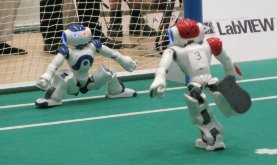



Instructor: Peter Stone
Department of Computer Science
Tuesday, Thursday 9:30-10:45am
GDC 6.202
office hours: TBA (please let me know in advance if you're coming) and any other time by appointment
office: GDC 3.508
phone: 471-9796
email: pstone@cs.utexas.edu
Josiah Hanna
office hours: Tuesday 3:30-4:30, Thursday 3-4, and by appointment.
room: Robolab, 3.710A
email: jphanna@cs.utexas.edu
This class is a graduate introduction to autonomous robotics and serves as a core class in the Graduate Portfolio Program in Robotics. There will be some assigned readings and discussions pertaining to robotics and multi-robot systems in general. Students will learn how to program the components of a team of robots for playing soccer under the rules of the RoboCup standard platform league using Aldebaran Nao robots. All students will learn how to program the robots directly. Challenges to be addressed will include some or all of the following:
If successful, class members may have the opportunity to follow up on their work in this course towards participating in an entry in a RoboCup competition.
Some background in artificial intelligence is recommended, but not required.
Sebastian Thrun, Wolfram Burgard, Dieter Fox
Probabilistic Robotics
MIT Press, 2005.
This will be used as a reference, rather than as a textbook, but we will use quite a few methods from it, and it is a valuable addition to your professional library.
While the Professor and the TA would be glad to answer any questions you have, you would frequently find your peers to be an equally important resource in this class.
Please subscribe to our class piazza page.
Grades will be based on
Reading, written, and programming assignments will be updated on the assignments page. Readings will be posted by the Tuesday before they are due (1 week in advance).Associated with most readings will be an assignment to send us a concise, well-thought-out, coherent written responses by email to the instructor and the TA. The email should be in plain ascii text in the body of the email (not an attachment). Please use the subject line "class readings for [due date]". The responses should be free form. Credit will be based on evidence that you have done the readings carefully. Acceptable responses include (but are not limited to):
These responses will be graded on a 10-point scale and graded mostly on coherence. Responses will be due by 5pm on Monday. Responses received between then and 9:00a.m. on the class day will be deducted 1 point (for a maximum score of 9). Responses received between then and 9:00a.m. the following class day will be deducted 2 points (for a maximum score of 8). Responses received after that will be deducted 4 points (for a maximum score of 6).These deadlines are designed both to encourage you to do the readings before class and also to allow us to incorporate some of your responses into the class discussions.
If you turn in your assignment late, expect points to be deducted. No exceptions will be made for the written responses to readings-based questions (subject to the ``notice about missed work due to religious holy days'' below). For other assignments, extensions will be considered on a case-by-case basis, but in most cases they will not be granted.
For the penalties on responses to the readings see above (under course requirements). Preliminary programming assignments may not be turned in late at all For other assignments (in this case, the final project), by default, 5 points (out of 100) will be deducted for lateness, plus an additional 1 point for every 24-hour period beyond 2 that the assignment is late. For example, an assignment due at 12:30pm on Tuesday will have 5 points deducted if it is turned in late but before 12:30pm on Thursday. It will have 6 points deducted if it is turned in by 12:30pm Friday, etc.
The greater the advance notice of a need for an extension, the greater the likelihood of leniency.
You are encouraged to discuss assignments with classmates. But all written work must be your own. And programming assignments must be your own except for 2-person teams on the final project. All work ideas, quotes, and code fragments that originate from elsewhere must be cited according to standard academic practice. Students caught cheating will automatically fail the course. If in doubt, look at the departmental guidelines and/or ask.
The University of Texas at Austin provides upon request appropriate academic accommodations for qualified students with disabilities. For more information, contact the Dean of Students at 471-6529; 471-4641 TTY.
A student who misses an examination, work assignment, or other project due to the observance of a religious holy day will be given an opportunity to complete the work missed within a reasonable time after the absence, provided that he or she has properly notified the instructor. It is the policy of the University of Texas at Austin that the student must notify the instructor at least fourteen days prior to the classes scheduled on dates he or she will be absent to observe a religious holy day. For religious holy days that fall within the first two weeks of the semester, the notice should be given on the first day of the semester. The student will not be penalized for these excused absences, but the instructor may appropriately respond if the student fails to complete satisfactorily the missed assignment or examination within a reasonable time after the excused absence.
Page maintained by
Peter Stone
Questions? Send me
mail